What's changed in eight years? Tunisians mark revolution anniversary
Tunisians rallied in downtown Tunis on Monday to commemorate the eighth anniversary of the 2011 uprising that unseated long-time authoritarian ruler Zine El-Abidine Ben Ali.
Marches and gatherings were held by different political parties, trade unions and civil society groups. Although a day of celebration, the anger among Tunisians was also visible over the revolution's unfulfilled goals, with widespread discontent over high living costs, unemployment and corruption.
"The current political class has been unable to offer a viable economic plan. Instead, it has continued to adopt old policies without reviving the country's economy," said Foued Ghorbali, a sociologist.
Similar thoughts were shared by Mounir Hassine, head of the Monastir branch of the Tunisian Forum for Economic and Social Rights (FTDES). He stressed that all successive governments since 2011 have made the same wrong political choices that go back to the 1980s.
"Until today, we are still restrained in an exclusive development model, exposed to the global system in which our country doesn't have the capacity nor the means to compete with," he explained. Hassine believes that such a model has impeded Tunisia from making its economic transition to a just and equal one that meets the needs of Tunisians, especially the most vulnerable.
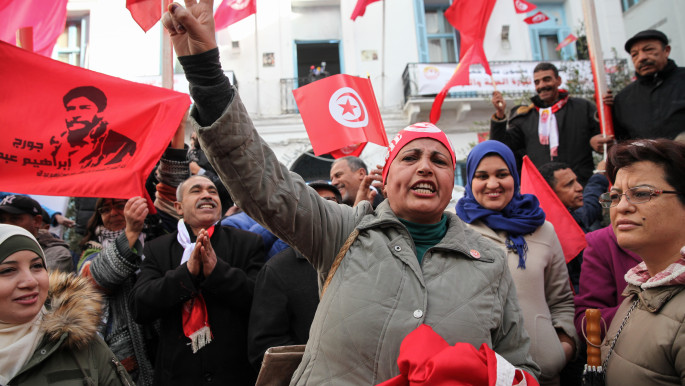 |
|
| A Tunisian woman attends the speech given by the general secretary of the Tunisian General Labour Union (UGTT) during the celebrations in Tunis [Getty] |
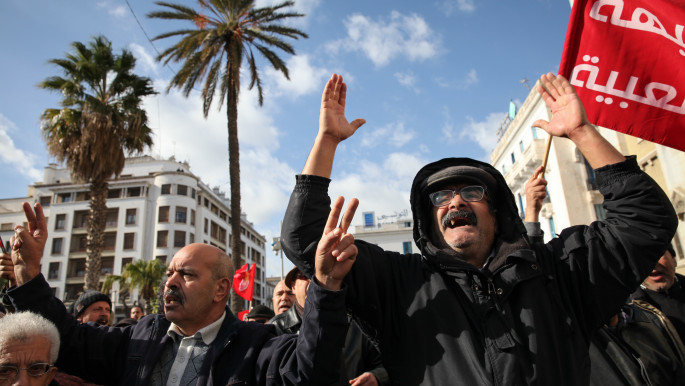 |
|
| Supporters of the Front Popular chant slogans against Tunisia's Ennahdha party during revolution day rallies [Getty] |
 |
Tunisians acknowledge that the uprising gave them freedom, one key positive gain when compared with the rest of the Arab region. But work and dignity, the other two revolutionary demands, have not been achieved to date |  |
In the current challenging economic context, Prime Minister Youssef Chahed has pushed ahead with unpopular reforms to comply with conditions set by international lenders.
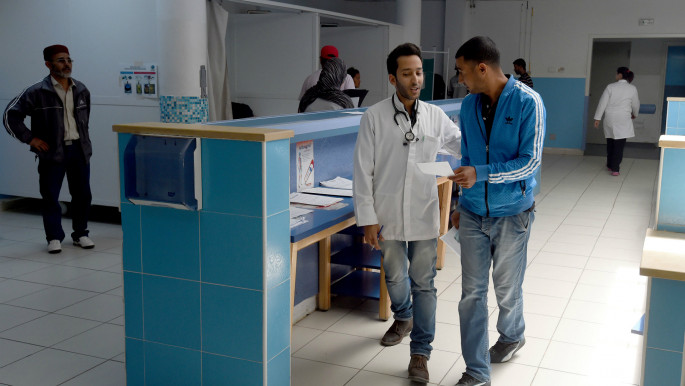 |
|
| Read also: Tunisians struggle as life-saving medicine shortage hits country |
Painful austerity measures have been implemented, including raising taxes, slashing fuel subsidies and cutting the public sector wage bill, which accounts for around half the national budget.
In addition, authorities have allowed the devaluation of the Tunisian dinar in an attempt to boost the competitiveness of exports, as recommended by the International Monetary Fund (IMF).
Grappling with a rampant inflation standing at less than eight percent, unemployment estimated at more than 15 percent and repeated hikes in the prices of basic commodities, the economic malaise has left many disheartened, particularly young people who feel that the revolution is only half way through its course.
Coupled with that, a persistent regional imbalance in economic resources has maintained a traditional disparity between the industrialised coast and the rural interior regions.
In Ben Ali's final budget prior to his overthrow, 82 percent of state funds were allocated to the coastal areas whereas only 18 percent went to the interior.
Tunisians acknowledge that the uprising gave them freedom, one key positive gain when compared with the rest of the Arab region. But work and dignity, the other two revolutionary demands, have not been achieved to date with the poor suffering more and the middle classes turning impoverished.
"What's changed in eight years? Well, we have gained a lot in terms of rights and freedoms, but from a socio-economic viewpoint, things have got worse," said Charfeddine Kalil, a human rights defender and the defence lawyer for the martyrs' families of the revolution.
Highlighting the rising poverty and unemployment rates, hitting young university graduates the hardest, he noted that the rise in social movements across the country is an indicator of the scale of the current crisis.
Kalil holds all political parties responsible for not finding solutions to the core problems of citizens throughout Tunisia's various regions.
 |
The North African country has been praised as a model of democratic transition, however wealth remains concentrated in the hands of a small elite |  |
"Parties only act for their own narrow interests at the expense to the detriment of people's social and economic grievances," the lawyer added.
He pointed to a growing distance between the political class and the average citizen, which has led to decreased trust in the various parties and apathy ahead of this year's elections.
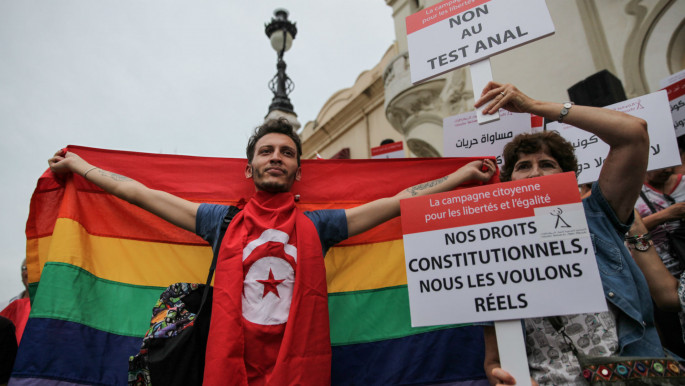 |
|
| Read also: Tunisia blazes trail in Arab world with embrace of human rights in new legal code |
Ghorbali reiterated that today's major problem lies in the "little credibility of the political elite". This is particularly felt among the Tunisian youth.
The North African country has been praised as a model of democratic transition, however wealth remains concentrated in the hands of a small elite.
Anger at the failure of the nine governments that have ruled since 2011 has driven Tunisians to the streets in recent years.
Last month, the apparent self-immolation of a Tunisian photojournalist to protest unemployment and corruption sparked protests. Abderrak Zorgui posted a video online before his self-immolation in the struggling provincial city of Kasserine describing his desperation and calling for revolt.
Zorgui expressed frustration at unemployment and unfulfilled promises of the Arab Spring revolution.
"We need an alternative development system that is economically and socially fair, and one that includes all sections of society, including the vulnerable categories," Hassine argued.
"If we just stick to an exclusive logic (for the few) there will not be any socio-economic transition and there won't be stability in the country," he added.
"Unless that change takes place, the revolution will continue."
Alessandra Bajec is a freelance journalist currently based in Tunis.
Follow her on Twitter: @AlessandraBajec
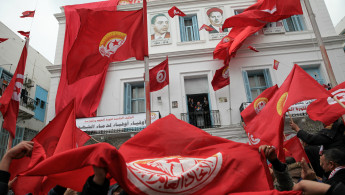

![Minnesota Tim Walz is working to court Muslim voters. [Getty]](/sites/default/files/styles/image_684x385/public/2169747529.jpeg?h=a5f2f23a&itok=b63Wif2V)






